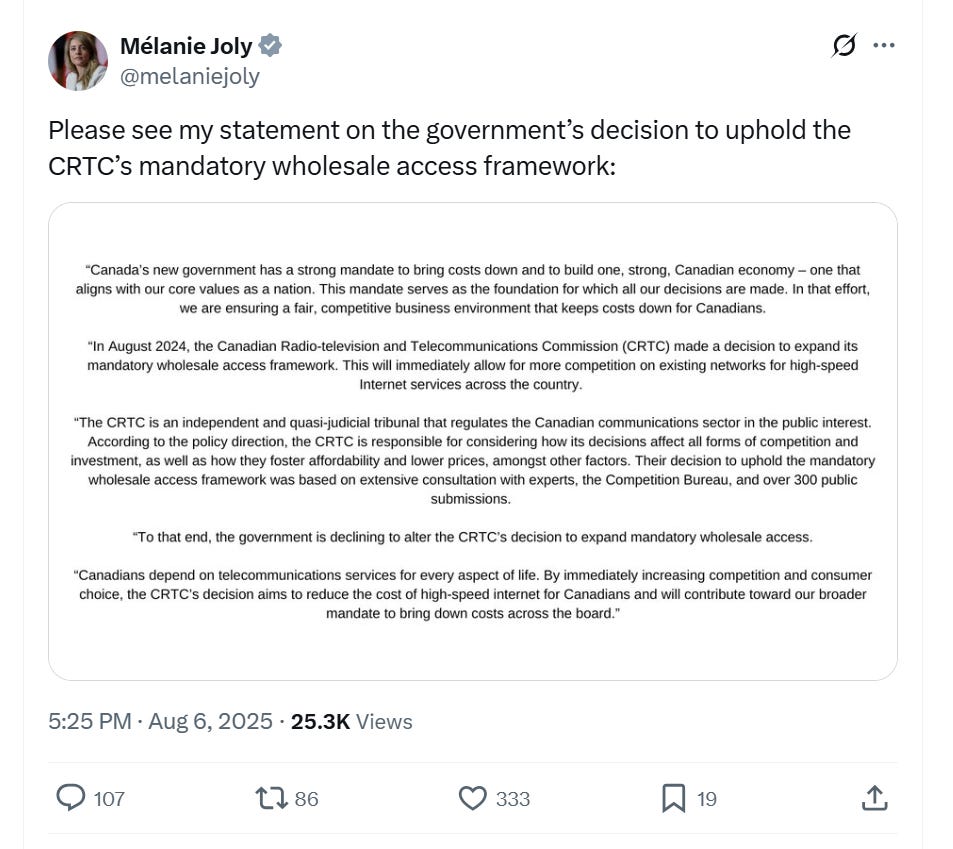“More competition”: CRTC ruling clears path for rival internet providers
The federal government will uphold the CRTC’s decision to permit internet companies to use fibre networks built by their rivals to provide service to customers located outside their primary areas.
The federal government will uphold the CRTC’s decision to permit internet companies to use fibre networks built by their rivals to provide service to customers located outside their primary areas of business.
Industry Minister Melanie Joly said Ottawa’s "decision to uphold the mandatory wholesale access framework was based on extensive consultation with experts, the Competition Bureau and over 300 public submissions.”
"To that end, the government is declining to alter the CRTC's decision to expand mandatory wholesale access," she said in a statement Wednesday.
According to Joly, the CRTC policy "will immediately allow for more competition on existing networks for high-speed internet services across the country."
An initial version of the CRTC framework was implemented in May 2024 but applied only to Ontario and Quebec. Canada's big three providers — Bell, Rogers and Telus — were then required to grant competitors access to their fibre-to-the-home networks, in exchange for a fee.
Bell Canada, Rogers Communications Inc. and a number of smaller companies fought against the CRTC's decision.
Bell claimed the policy would discourage major providers from investing in their own infrastructure, with some independent carriers arguing that it impedes their competitive ability against bigger companies.
However, Telus Corp. supported the decision, saying it was a way to boost competition and increase affordability for customers.
The CRTC then announced last August that the rules would be applicable across Canada to all telephone companies as well.
The federal government subsequently asked the CRTC to reconsider whether Bell, Rogers and Telus should be able to act as wholesalers under the rules due to worries that smaller internet providers would act as alternatives.
Following consultations, the CRTC issued a temporary decision in February to uphold the policy, while it undertook a further review of the framework.
During that period, Bell, Rogers and the Canadian Telecommunications Association called on Ottawa to overturn the regulator's decision, with Bell announcing it planned to cut $500 million in investment plans this year as a result.
The commission ultimately determined in June that its framework effectively balanced the need for both competition and investment and gave the federal government until next Wednesday to make a decision on their ruling.
Ottawa sided with the CRTC's framework and upheld the commission's ruling Wednesday.
"By immediately increasing competition and consumer choice, the CRTC's decision aims to reduce the cost of high-speed internet for Canadians and will contribute toward our broader mandate to bring down costs across the board," said Joly.





YES... I understand that there are real and huge costs to building and maintaining a Fibre Optic Network... I GET THAT...
.... BUT ....
We have and continue to be held hostage with respect to services, Internet, Cell and TV amongst those by a few companies... Less than can be counted on one hand ... In this country.
The solution is to open up the market(s) one way or another to competition and if this move is a start, all be it a sorry sad one, let that begin.
I am tired of getting those "TO SERVE YOU BETTER" notices once or twice a year.